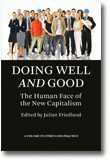
Doing Well and Good
The Human Face of the New Capitalism
Edited by:
Julian Friedland, Fordham University
A volume in the series: Ethics in Practice. Editor(s): Robert A. Giacalone, Texas State University. Carole L. Jurkiewicz, University of Colorado, Colorado Springs.
Published 2009
Ethical business creates social value. That’s the theme of this bold new volume, heralding and defending this rapidly-growing new conception of capitalism making its way into the mainstream. It provides clear and succinct guidelines for how to evaluate what counts as an ethical business as well as how and why ethical businesses tend to succeed better over the long term. The book is jargon-free and targeted primarily at thought leaders and academics in business and philosophy who will want to use it in their business ethics classes. Each chapter has been selected for its ability to engage a wide audience without oversimplifying the content.
All twelve chapters are original and authored by leading business ethicists including William Shaw, Tony Simons, Duane Windsor, and Mark Schwartz. Each piece makes use of recent empirical evidence or ethical theory (or both) in order to present a detailed yet overarching picture of what ethical business looks like--and how to achieve it--in today’s global environment. It is thus divided into three subsections:
1. The Role of Corporate Culture
2. A New For-Profit Paradigm
3. Making the Change Happen: Voluntary and Regulatory Examples
Perhaps the book’s greatest strength is its blending of cutting-edge philosophy, psychology, and management theory into a cohesive, provocative, and accessible format. Hence, it promises to launch a wide discussion of what exactly we should expect the moral duty of business to be.
CONTENTS
Introduction: Ushering in the New Capitalism, Julian Friedland. PART I: THE ROLE OF CORPORATE CULTURE. Getting Business Off Steroids, Maximilian B. Torres. Does Corporate Social Responsibility Affect Consumer Behavior? Larry Howard. Facing the Stakeholder Trust Gap, Michael Pirson. PART II: A NEW FOR-PROFIT PARADIGM. Being Serious About Being Good, Eugene Heath. Transforming the Ethical Culture of Organizations, Steve May. Beyond the Invisible Hand, William H. Shaw. Beyond The Bottom Line: A Shifting Paradigm for Business? Mark S. Schwartz. PART III: MAKING THE CHANGE HAPPEN: VOLUNTARY AND REGULATORY EXAMPLES. The Integrity Dividend and “Doing Good”, Tony Simons. Determining a Job Candidate’s Ethics Profile: Integrity, Personality, and Moral Reasoning Level Tests, Denis Collins. Multinational Corporations and Basic Health Services, Duane Windsor. Legislative Excess or Regulatory Brilliance? Corporate Governance After Sarbanes-Oxley, Gwendolyn Yvonne Alexis.
REVIEWS
"Business Ethics Memo author Friedland has brought together several leading voices in the field of business ethics for a round of cogitation about the possibility of a more humane, less exploitative capitalism. The core idea of the book is that ‘ethical business creates social value’ (ix). Thus, even if it means ‘transforming the very culture of capitalism’, the possibility of a more enlightened capitalism can and probably must be deliberately pursued. As Friedland sees it, ‘we cannot simply rely on government regulation, corporate leadership, or consumers’ to bring about this more enlightened approach to doing business. Rather, ‘all three of these socioeconomic forces must play a role’ because one or two of them cannot produce sufficient force to stem the tide. As a result, while there is much work to be done, there is reason to be guardedly optimistic, and this volume discusses both the task and the reasons for optimism." Bryan Finken University of Colorado at Denver in Philosophy in Review
MORE INFORMATION
>> Download the complete review from Philosophy in Review
-
Paperback978-1-59311-787-0
Web price: $45.04 (Reg. 52.99)
-
Hardcover978-1-59311-788-7
Web price: $80.74 (Reg. 94.99)
- eBook9781607521761

- BUS008000 - BUSINESS & ECONOMICS: Business Ethics
- BUS041000 - BUSINESS & ECONOMICS: Management
- BUS030000 - BUSINESS & ECONOMICS: Human Resources & Personnel Management
-
 Diversity as Strategic Opportunity
Exploring New Paths to Good Administration
Diversity as Strategic Opportunity
Exploring New Paths to Good Administration
-
 Educating in Ethics Across the Professions
A Compendium of Research, Theory, Practice, and an Agenda for the Future
Educating in Ethics Across the Professions
A Compendium of Research, Theory, Practice, and an Agenda for the Future
-
 Ethics and Risk Management
Ethics and Risk Management
-
 Ethics Training in Action
An Examination of Issues, Techniques, and Development
Ethics Training in Action
An Examination of Issues, Techniques, and Development
-
 How to Transform Workplace Bullies into Allies
How to Transform Workplace Bullies into Allies
-
 Organizational Ethics and Stakeholder Well-Being in the Business Environment
Organizational Ethics and Stakeholder Well-Being in the Business Environment
-
 Radical Thoughts on Ethical Leadership
Radical Thoughts on Ethical Leadership

